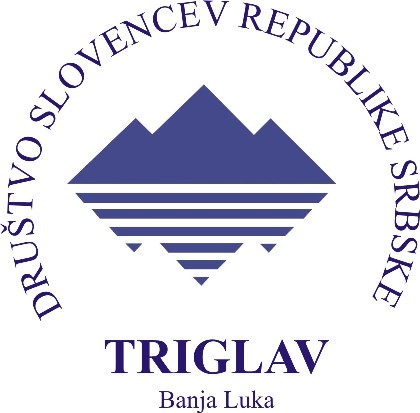At the initiative of Barbara Zorman, PhD, from the University of Primorska, students of supply teaching lessons of Slovenian language in Banja Luka, have established cooperation with students attending the second year of pedagogy in Koper. 49 female students participated.
As part of the practical work on the subject of Interculturality in Education, led by Barbara Zorman, PhD, connected with the help of the Zoom application with students learning Slovenian with Barbara Hanuš. The university students asked the students of supply teaching lessons about their attitude towards Slovenia, about the work of the Association of Slovenians Triglav and life in Banja Luka.
Some of their findings:
- I realized how different we are but at the same time similar; how much we can learn from other cultures and thus enrich our lives. I am happy for this experience! :)
- Through the interview, we have learned that the inhabitants of Banja Luka are interested in our culture and it is quite different from ours. We learned that learning the Slovenian language can be a real treat, and at the same time they try to learn the Slovenian language in order to integrate more easily into the Slovenian university or work environment.
-It is nice to see how members of another nation appreciate the Slovenian nation, culture and language. It is interesting to see how much they want to learn Slovenian, and the fact that they have the opportunity to watch Slovenian television programmes means a lot to them. We realized that learning the Slovenian language is a great challenge and that we can be proud of our special language and culture.
-First of all, the interview positively surprised me because I did not expect such a positive experience. We got on really well with our interlocutor and we talked for a long time, and we also agreed to go for coffee when she came to Slovenia. I am thrilled to see that people from other cultures also want to learn our language on their own initiative, which is actually not easy to learn. I am really glad that I had the opportunity to have such an experience :)
-I have found that people attach great importance to their roots and want to get to know them, get to know the existing culture and be a part of it.
-We were positively surprised by a conversation with a student from Banja Luka who has Slovenian roots, because she was very eloquent, her knowledge of the Slovenian language is excellent, she expressed her enthusiasm for Slovenia and her desire to live and study in Slovenia. Although her grandmother's mother was Slovenian, she also preserves Slavic culture and language and says that she and her family are both Slovenians and Serbs. It was nice to see the great desire of the student to get in touch with Slovenian roots.
-The conversation left a positive impression on me. I am glad that they are learning the Slovenian language with such joy and that it means so much to them. It’s nice to see that they’re interested in other cultures as well. I am also happy that they want to get to know Slovenia and its people, and one day even come here.
-The conversation with a lady from Bosnia who has Slovenian roots was very relaxed and pleasant. We both agree that it was a positive experience through which we were able to get to know her culture as well as ours through her eyes. The most interesting thing for us was that the lady in Slovenia feels at home, that she really appreciates our nature and kindness among people. She also told us that she considers Slovenians a nation that highly values its language, culture and country.
-Talking to the lady gave me an insight into a different way of life how her family was displaced. She lives alone in Banja Luka, one daughter lives in Ljubljana, the other in Vienna. As a retiree, she is very active, which I really liked.
-The interview positively surprised us because we also started to look at our culture more positively, we received information about what it is like to live abroad and about a personal view of life in Banja Luka.
-In an interview with Mr. Mladen Bubonjić, we learned that he knows a lot about the history of his family and Slovenian culture. He also gave us a lot of information about society itself. Even though he is very busy, he dedicated a lot of his time to answer our questions.
-After talking to Barbara Hanuš, we realized how important empathy and understanding is in working with immigrant students. She showed us that everyone can, with a certain desire and will, help immigrant students the best they can, regardless of profession or position at school.
Students of the second year of pedagogy at the University of Primorska
Translation: Ana Marjanović







